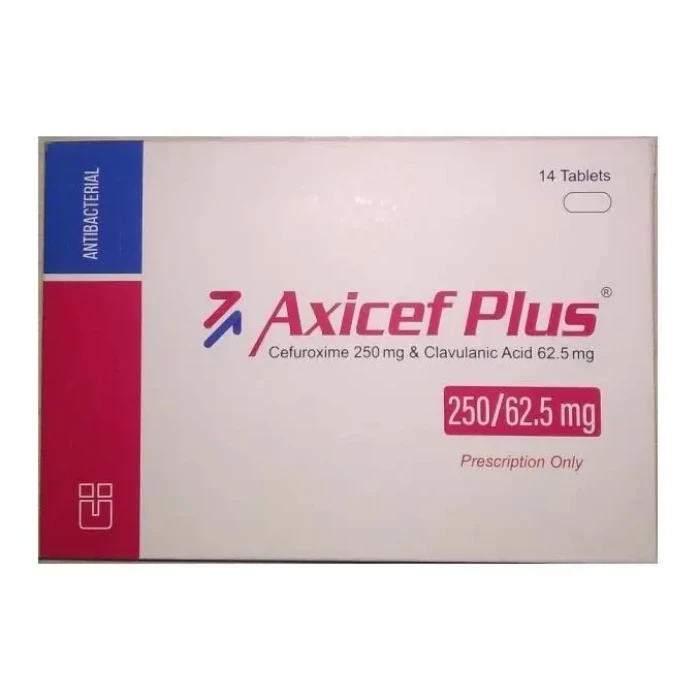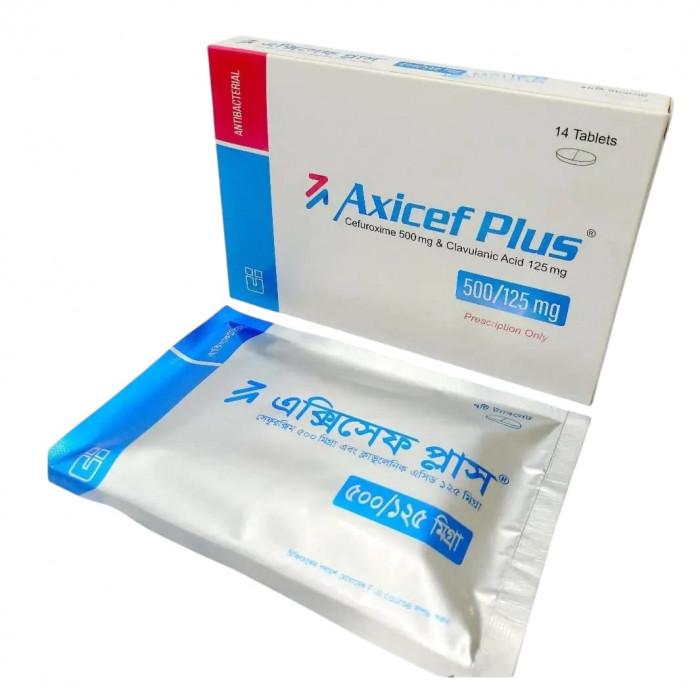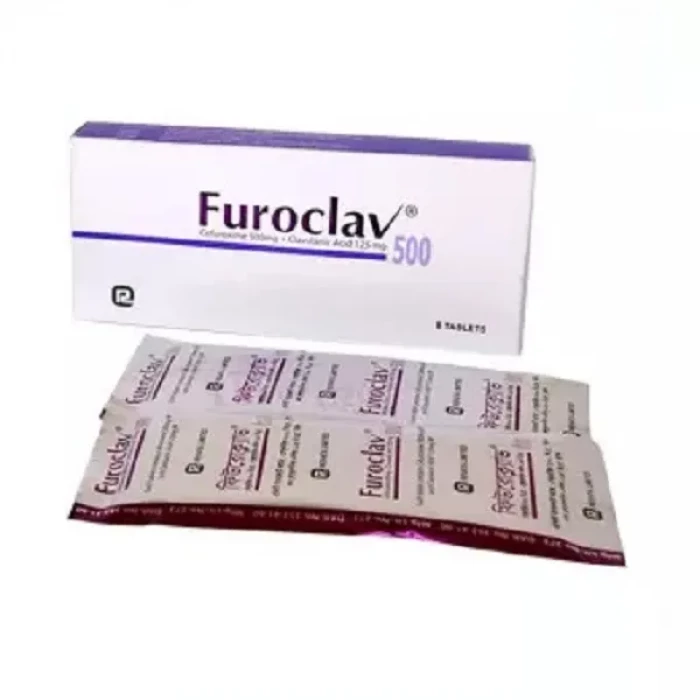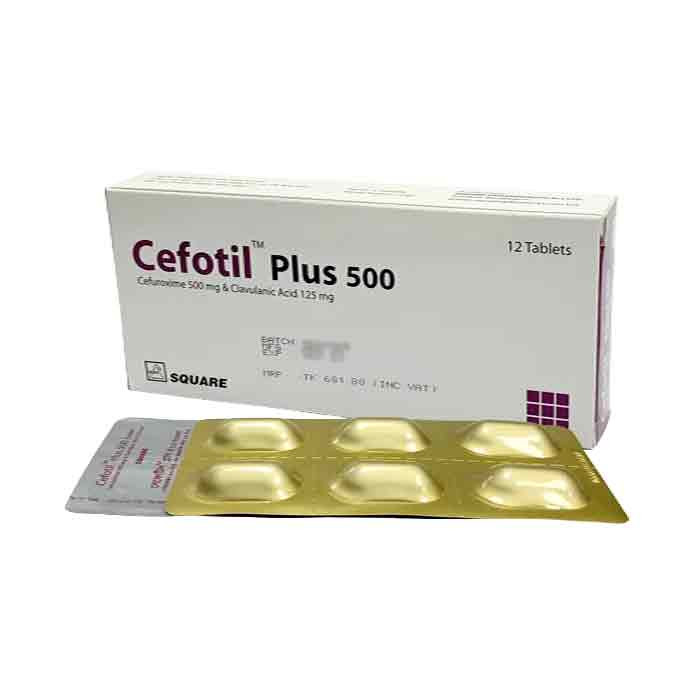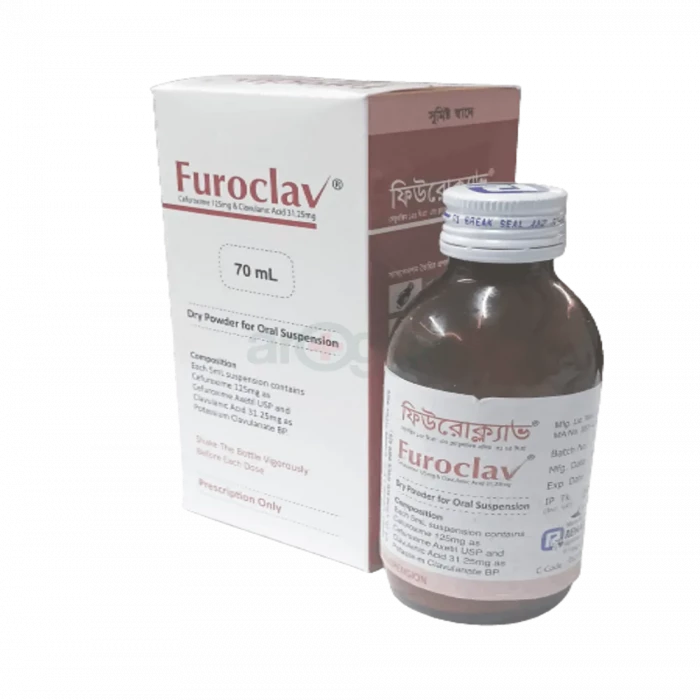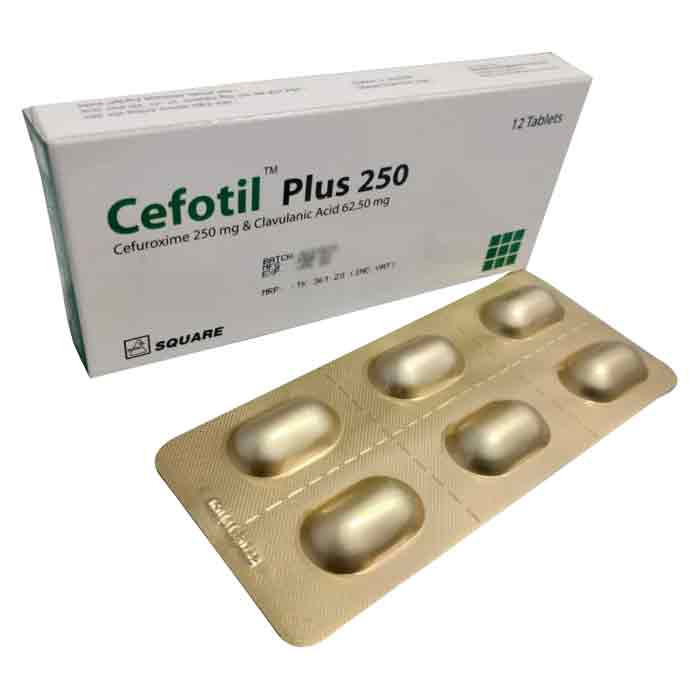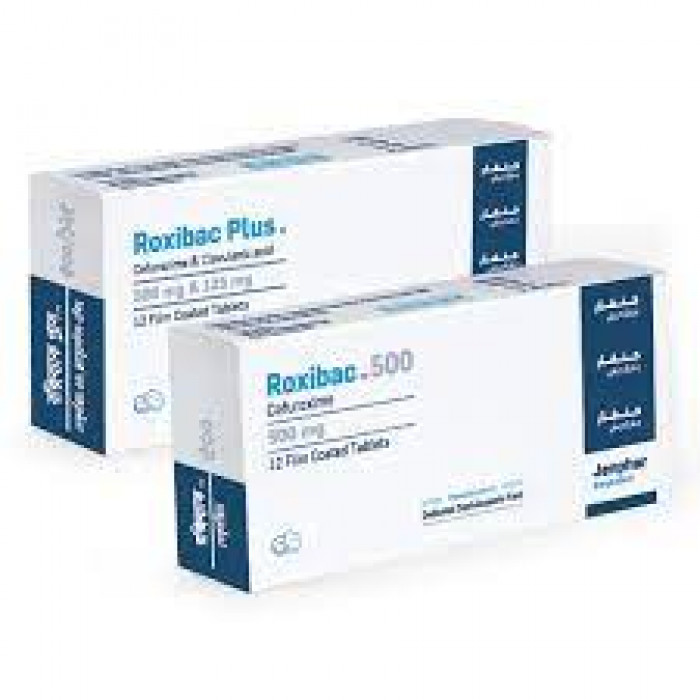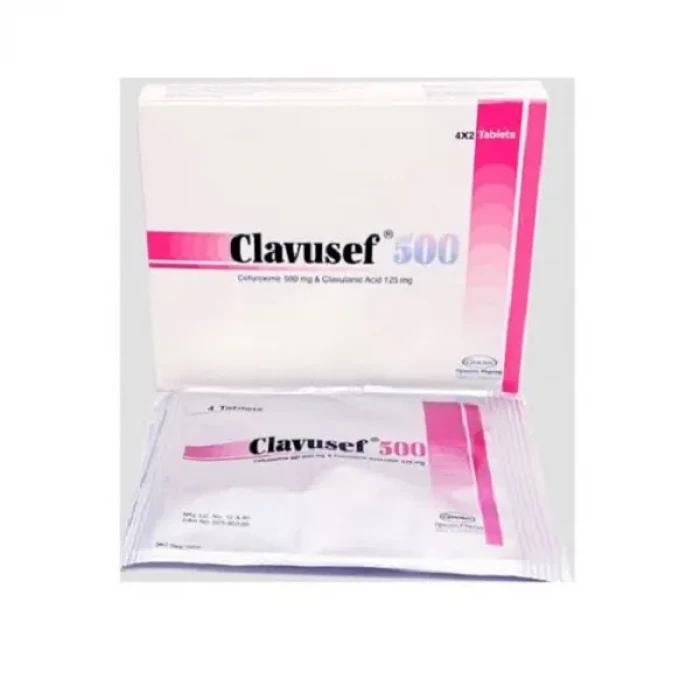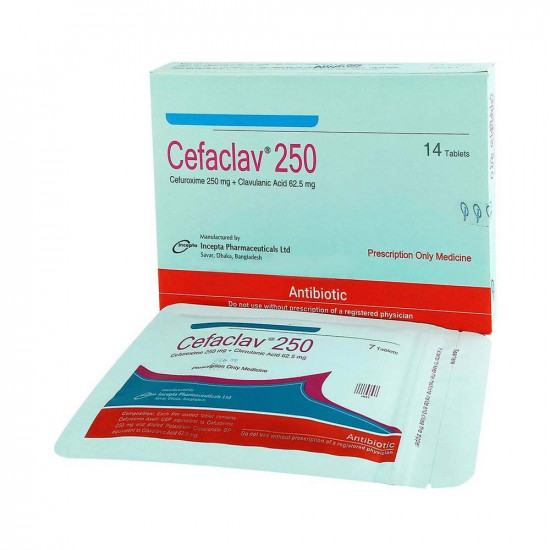
✔ 100% Authentic Product
👁️ Currently Viewing 5253
Cefaclav 250mg Tablet
- An antibiotic called Cefaclav 250 Tablet contains the ingredients cefuroxime and clavulanic acid. Bacterial infections of the lungs, nose, throat, ears, skin, and urinary tract are treated with it. It acts by hindering the bacterial cell wall's development and finally kills them. The Cefaclav 250 Tablet is ineffective against viral infections.
- Some typical adverse effects of Cefaclav 250 Tablet include diarrhea, stomach discomfort, headache, weakness, nausea, and vomiting. Avoid operating machinery or operating a car while taking this medication since it may make you drowsy or dizzy. If you have ever had an allergy to this medication, avoid using it. If any adverse effects persist for a prolonged length of time, speak with your doctor. It is not advised to give Cefaclav 250 Tablets to children under the age of 12.
Discount
Price: ৳ 233
MRP:
৳
245
5%
Off

100% Genuine Products, Guaranteed

Safe & Secure Payments, Always

Fast, Secure & Efficient Delivery

Proper Packaging
 Cash on Delivery - All over Bangladesh
Cash on Delivery - All over Bangladesh Regular Delivery - 12-24 Hours, Dhaka City* Charge Tk.39-59
Regular Delivery - 12-24 Hours, Dhaka City* Charge Tk.39-59 Regular Delivery - 24-48 Hours, Other Cities* Charge Tk.99-110
Regular Delivery - 24-48 Hours, Other Cities* Charge Tk.99-110
 ফ্রি ডেলিভারিঃ - ৯৯৯ টাকা+ অর্ডারে, ঢাকা
শহরে
ফ্রি ডেলিভারিঃ - ৯৯৯ টাকা+ অর্ডারে, ঢাকা
শহরে ফ্রি ডেলিভারিঃ - ২৯৯৯ টাকা+ অর্ডারে, ঢাকার
বাহিরে
ফ্রি ডেলিভারিঃ - ২৯৯৯ টাকা+ অর্ডারে, ঢাকার
বাহিরে
100% Genuine Products, Guaranteed
Safe & Secure Payments, Always
Fast, Secure & Efficient Delivery
Proper Packaging
 Cash on Delivery - All over Bangladesh
Cash on Delivery - All over Bangladesh Regular Delivery - 12-24 Hours, Dhaka City* Charge Tk.39-59
Regular Delivery - 12-24 Hours, Dhaka City* Charge Tk.39-59 Regular Delivery - 24-48 Hours, Other Cities* Charge Tk.99-110
Regular Delivery - 24-48 Hours, Other Cities* Charge Tk.99-110 ফ্রি ডেলিভারিঃ - ৯৯৯ টাকা+ অর্ডারে, ঢাকা
শহরে
ফ্রি ডেলিভারিঃ - ৯৯৯ টাকা+ অর্ডারে, ঢাকা
শহরে ফ্রি ডেলিভারিঃ - ২৯৯৯ টাকা+ অর্ডারে, ঢাকার
বাহিরে
ফ্রি ডেলিভারিঃ - ২৯৯৯ টাকা+ অর্ডারে, ঢাকার
বাহিরে
✅ Description:
- Cefaclav 250 belongs to the group of medicines called antibiotics used to treat various bacterial infections such as pharyngitis/tonsillitis (throat infections), otitis media (ear infections), sinusitis (infection of the sinuses), gonorrhea (sexually transmitted disease), Lyme disease, septicemia (bloodstream infection), meningitis (inflammation of the brain and spinal cord), lower respiratory tract, skin, urinary tract, bone, and joint infections.
- Cefuroxime (a cephalosporin antibiotic) and Clavulanic acid are the two antibiotics combined in Cefaclav 250. (beta-lactamase inhibitor). Cefuroxime prevents the bacterial cell covering from forming, which is essential for their survival. destroys the bacterium as a result. In order to combat germs, clavulanic acid increases the effectiveness of cefuroxime while reducing bacterial resistance. Cefaclav 250 treats bacterial illnesses in combination.
- You can take Cefaclav 250 Tablets with or without meals. Take this tablet at around the same time each day to make it easier to remember. It is usually advised to finish the whole course of therapy with an antibiotic once treatment has begun. Antibiotics shouldn't be used without first talking to your doctor since overusing them might make them less effective.
- Live vaccines may interact with Cefaclav 250 Tablet. As a result, leave at least two hours between administrations. Before using this medication, let your doctor know if you have any liver, renal, seizure, or gastrointestinal conditions. It is advised to only use this medication after seeing your doctor if you are pregnant, planning a pregnancy, or nursing.
Safety Advices

Alcohol
CAUTION
Avoid consuming alcohol while taking Cefaclav Tablet 250mg to prevent unpleasant side effects.

Pregnancy
CAUTION
Cefaclav Tablet 250mg falls under category B for pregnancy. If you are pregnant, talk to your doctor before taking Cefaclav Tablet 250mg. Your doctor will only recommend it if the advantages exceed the dangers.

Breastfeeding
SAFE IF PRESCRIBED
Cefaclav Tablet 250mg is safe to use during breastfeeding. Human studies suggest that the drug does not pass into the breastmilk in a significant amount and is not harmful to the baby.

Driving
CAUTION
Not relevant, as Cefaclav Tablet 250mg is intended for use in hospitalized patients.

Kidney
SAFE IF PRESCRIBED
Dose adjustment may be needed. Please consult your doctor if you have any concerns regarding this or if you have kidney impairment/kidney disease before taking Cefaclav Tablet 250mg.

Liver
CONSULT YOUR DOCTOR
Dose adjustment may be needed. Please consult your doctor before taking Cefaclav Tablet 250mg if you have liver impairment/liver disease.
✔️ Uses of Cefaclav 250
- Treatment of Bacterial Infections
✔️ Side Effects of Cefaclav 250
- Nausea
- Vomiting
- Diarrhoea
- Difficult or painful urination
- Change in taste
- Acid or sour stomach
- Abdominal discomfort or pain
✔️ How Cefaclav 250 works?
Cefuroxime and clavulanic acid are two medications included in the Cefaclav 250 Tablet. An antibiotic is Cefuroxime. It functions by halting the development of the bacterial protective coating, which is necessary for germs to survive in the human body. A beta-lactamase inhibitor called clavulanic acid prevents bacteria from producing the enzymes needed to render Cefuroxime inactive. Clavulanic Acid increases the action of Cefuroxime against microorganisms while reducing resistance.
✔️ Quick Suggestions:
- Even if the germs are resistant, this combination medication has been recommended for you to treat bacterial infections.
- Even if you feel better, do not miss any doses and complete the whole course of therapy. If you stop it too soon, the infection can return and be more difficult to cure.
- Take it with meals to prevent gastric distress.
- A side effect that might happen is diarrhea. Probiotic use may be beneficial. If you see bloody stools or get cramping in your stomach, consult your doctor.
- If you have a scratchy rash, or facial, tongue, or throat swelling while using Cefaclav 250, stop using it right away, and let your doctor know.
- Never again treat any infection with unused medication. Never use an antibiotic without first talking to your doctor.
✔️ Indications of Cefaclav 250 Tablet
Cefaclav 250 is used for the treatment of various bacterial infections such as:
- Tonsillitis or Pharyngitis
- Otitis media with bacteria in it
- Bacterial maxillary sinusitis is acute
- Pneumonia and other lower respiratory tract illnesses
- Secondary bacterial infections of acute bronchitis and acute
- Bacterial Exacerbations of chronic bronchitis
- Infected skin and skin structure
- Infections of the urinary tract
- Infected bones and joints
- Gonorrhoea (uncomplicated and disseminated gonococcal infections)
- Incipient Lyme illness (erythema migrans)
- Septicemia
- Meningitis
- After surgery, change the patient's treatment from injectable to oral when their condition has improved.
✔️ Pharmacology
A second-generation cephalosporin antibiotic called cefuroxime is bactericidal and kills a variety of Gram-positive and Gram-negative bacteria, including many strains that produce beta-lactamases. Cefuroxime prevents bacteria from producing cell walls by interfering with the transpeptidation process. A naturally occurring beta-lactamase inhibitor, clavulanic acid is created by the bacterium Streptomyces clavuligerus. Its structure is similar to that of beta-lactam antibiotics, and it binds to beta-lactamase enzymes and irreversibly inactivates them. Cefuroxime is a treatment option for bacterial infections because clavulanic acid shields it from degradation by beta-lactamase enzymes.
✔️ Dosage & Administration of Cefaclav 250 Tablet
- Adolescents and adults (13 years and older)-
- Pharyngitis/tonsillitis: 250 mg b.i.d. for 5-10 days
- Acute bacterial maxillary sinusitis: 250 mg b.i.d. for 10 days
- Acute bacterial exacerbation of chronic bronchitis: 250-500 mg b.i.d. for 10 days
- Secondary bacterial infections of acute bronchitis: 250-500 mg b.i.d. for 5-10 days
- Uncomplicated skin and skin structure infections: 250-500 mg b.i.d. for 10 days
- Uncomplicated urinary tract infections: 250 mg b.i.d. for 7-10 days
- Uncomplicated Gonorrhoea: 1000 mg b.i.d. Single dose
- Community-acquired pneumonia: 250-500 mg b.i.d. for 5-10 days
- MDR Typhoid Fever: 500 mg b.i.d. for 10-14 days
- Early Lyme disease: 500 mg b.i.d. for 20 days
- Pediatric Patients (3 months to 12 years)-
- Pharyngitis/Tonsillitis: 20 mg/kg/day b.i.d for 5-10 days
- Acute otitis media: 30 mg/kg/day b.i.d for 10 days
- Acute bacterial maxillary sinusitis: 30 mg/kg/day b.i.d for 10 days
- Impetigo: 30 mg/kg/day b.i.d for 10 days
- The cefuroxime-Clavulanic Acid tablet may be taken without regard to food.
✔️ Interaction
Combining probenecid and cefuroxime-clavulanic acid increases the area under the serum concentration versus the time curve by 50%. Cefuroxime's bioavailability may be compromised and the effects of postprandial absorption may be counteracted by a medication that reduces stomach acidity.
✔️ Contraindications
Cefuroxime-Clavulanic Acid is not recommended for people who have a known cephalosporin allergy or who have Pseudomembranous Colitis.
✔️ Pregnancy & Lactation
If at all possible, steer clear of antibiotics during the first trimester. Contrarily, urinary and other infections can be safely treated later in pregnancy with cefuroxime-clavulanic acid. Small amounts of cefuroxime-clavulanic acid are excreted in breast milk. However, it is important to take into account the possibility of the newborn becoming sensitized.
✔️ Precautions & Warnings
Cefuroxime should be used with caution in individuals who are taking powerful diuretics and have a history of colitis.
✔️ Storage Conditions
Store in a cool, dry place (below 30o C), away from light and moisture. Keep out of the reach of children.
⚠️Disclaimer:
At ePharma, we’re committed to providing accurate and accessible health information. However, all content is intended for informational purposes only and should not replace medical advice from a qualified physician. Please consult your healthcare provider for personalized guidance. We aim to support, not substitute, the doctor-patient relationship.




